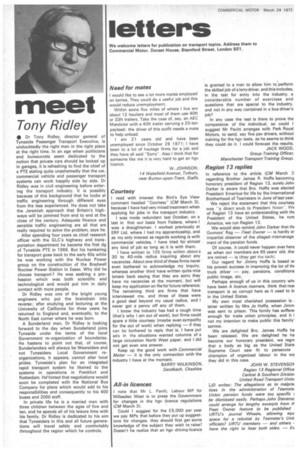meet
Page 40

If you've noticed an error in this article please click here to report it so we can fix it.
Tony Ridley
• Dr Tony Ridley, director general of Tyneside Passenger Transport Executive, is undoubtedly the right man in the right place at the right time. In an age when politicians and bureaucrats seem dedicated to the notion that private cars should be locked up in garages, it is refreshing to find the chief of a PTE stating quite unashamedly that the car, commercial vehicle and passenger transport systems can work happily side by side. Dr Ridley was in civil engineering before entering the transport industry. It is possibly because of this background that he looks at traffic engineering through different eyes from the less experienced. He does not take the Jeremiah approach that Britain's highways will be jammed from end to end at the close of the century. Adequate finance and sensible traffic engineering are all that are really required to solve the problem, says he.
After spending four years as chief research officer with the GLC's highway and transportation department he became the first dg of TyneSide PTE in 1969. But his hankering for transport goes back to the early 60s while he was working with the Nuclear Power group on the construction of the Bradwell Nuclear Power Station in Essex. Why did he choose transport? He was seeking a profession which was both scientific and technological and would put him in daily contact with more people.
Dr Ridley was one of the bright young engineers who put the braindrain into reverse; after studying and lecturing at the University of California for three years he returned to England and, eventually, to the North East corner where he was born.
A Sunderland man, Dr Ridley is looking forward to the day when Sunderland joins Tyneside under the terms of the local Government re-organization of boundaries. He hastens to point out that, of course, Sunderlanders will always be Wearsiders and not Tynesiders. Local Government reorganizations, it appears, cannot alter local prides. Tyneside's plan for an integrated rapid transport system he likened to the systems in operations in Frankfurt and Rotterdam. He' hinted that negotiations would soon be completed with the National Bus Company for plans which would add to his responsibilities and consequently to his 400 buses and 2000 staff.
In private life he is a married man with three children between the ages of five and ten, and he spends all of his leisure time with his family. Dr Ridley is dedicated to his aim that Tynesiders in this and all future generations will travel safely and comfortably throughout the region which he controls.




















































































































































